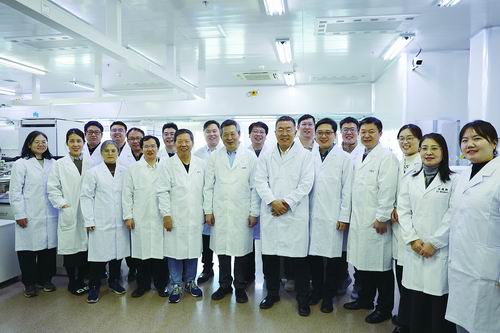刘晓艳代表:破解“二十多年前的未解之问”
印遇龙代表:生猪养殖臭气需标本兼治
多管齐下,为原始创新松绑
全球沿海海平面高度平均被低估约0.3米
生物合成“清道夫”,让老年痴呆症治疗迎新曙...
杨建成委员:以重离子之翼托举新质生产力
- ·重庆科协青年科技人才托举工程拟托举对象公示
- ·在科技制高点,筑牢“自主可控”基石
- ·钱前代表:加强营养风味特色作物开发创新
- ·安徽公示2026年度第一批拟入库科技评审专家
- ·国家卫生健康委公开征集创新药物重大专项立项...
- ·潘建伟委员:葡京网投app_澳门葡京游戏-【在线*平台】:量子科技多方面跃居国际前列
- ·杨洪明委员:推动低空经济与智能农机协同发展
- ·中国“光计算芯片”降维打击英伟达GPU?研究...
- ·第四届全国创新争先奖评选表彰工作启动
- ·第四届全国创新争先奖评选表彰工作启动
- ·国家卫生健康委公开征集创新药物重大专项立项...
- ·动物试验替代技术渐趋成熟
- ·关键核心技术攻关为何要采取超常规措施
- ·谢晓亮被授予香港中文大学荣誉理学博士学位
- ·2025年度厦门科学技术奖受理项目(人)名单公...
生物合成“清道夫”,让老年痴呆症治疗迎新曙...
E3连接酶在玉米逆境适应与养分利用中起核心作...
- ·浙江理工大学药用植物团队博士后(含师资...
- ·广东工业大学诚邀海外英才依托申报2026年...
- ·广州国家实验室石正丽课题组公开招聘
- ·葡京网投app_澳门葡京游戏-【在线*平台】:广州地球化学研究所基建项目经...
- ·成都山地所特别研究助理(博士后)招聘启事
- ·华中农业大学第十一届南湖国际青年学者论...
- ·NIBS徐墨实验室招聘博士后及科研助理
- ·南方科技大学医学院循环肿瘤细胞(CTC)洪...
- ·中国医学科学院系统医学研究院/苏州系统...
- ·海南大学杨玮枫团队科研葡京网投app_澳门葡京游戏-【在线*平台】启事
- ·温州理工学院诚邀全球英才依托申报2026年...
- ·南京航空航天大学电子信息工程学院诚邀全...













































